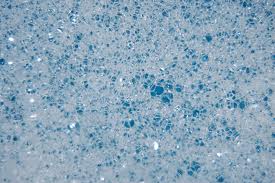lather
英 [ˈlɑː.ðər]
美 [ˈlæð.ɚ]
- n. 肥皂泡;激动
- vt. 涂以肥皂泡;使紧张;狠狠地打
- vi. 起泡沫
- n. (Lather)人名;(英)拉瑟
星级词汇:

记忆方法
将“lather”与“laugh”和“ather”组合起来记忆。想象一个场景:有人在“laughing”(大笑)时,头上有泡沫“ather”,就像洗头时洗发水泡沫般的感觉,这样就容易记住“lather”这个单词,它表示泡沫或大量泡沫的意思。
以上内容由AI生成, 仅供参考和借鉴
中文词源
lather 涂肥皂,肥皂泡。
来自PIE*leu,冲洗,词源同lava,lavatory,-ther,工具格后缀。引申词义用肥皂清洗,肥皂泡。
英语词源
- lather
-
lather: [OE] Indo-European *lou- denoted ‘wash’ (from it English gets laundry, lavatory, lotion, etc). Addition of the suffix *-tro- produced *loutrom, which passed via Germanic *lauthram into English as lather. In Old English this is only recorded as meaning ‘washing soda’, and the modern sense ‘soap bubbles’ does not emerge until the late 16th century.
=> ablution, laundry, lavatory, lotion - lather (n.)
- Old English lauþr "foam, washing soda," from Proto-Germanic *lauthran (cognates: Old Norse lauðr "washing soap, foam"), from PIE *loutro- (cognates: Gaulish lautron, Old Irish loathar "bathing tub," Greek louein "to bathe," Latin lavere "to wash"), which is from root *leu(e)- "to wash" + instrumentative suffix *-tro-. The modern noun might be a 16c. redevelopment from the verb. Meaning "violent perspiration" (especially of horses) is from 1650s. Meaning "state of agitation" (such as induces sweating) is from 1839.
- lather (v.)
- Old English laþran, from Proto-Germanic *lauthrjan (source also of Old Norse leyðra "to clean, wash;" see lather (n.)). Related: Lathered; lathering.
权威例句
- 1. He wiped off the remains of the lather with a towel.
- 他用毛巾抹去余下的皂沫。
- 2. For super-soft skin, lather on a light body lotion before you bathe.
- 皮肤极柔嫩者,可在沐浴前涂上温和的护肤露。
- 3. Lather your hair as normal.
- 像平常那样在头发上抹上洗发液。
- 4. "I'm not going to get into a lather over this defeat," said the manager.
- “我不会因为这次失败而不快,”经理说道。
- 5. You have spent the past six months working yourself up into a lather over situations which are really none of your business.
- 过去半年你一直在为压根儿和你无关的事情心急上火。
